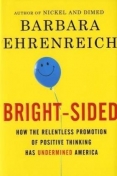BKMT READING GUIDES
Bright-sided: How the Relentless Promotion of Positive Thinking Has Undermined America
by Barbara Ehrenreich
Hardcover : 235 pages
0 club reading this now
0 members have read this book
A sharp-witted knockdown of America's love affair with positive thinking and an urgent call for a new commitment to realism
Americans are a ?positive? people?cheerful, optimistic, and upbeat: this is our reputation as well as our self-image. But more than a temperament, being positive, we ...
Introduction
(
A sharp-witted knockdown of America's love affair with positive thinking and an urgent call for a new commitment to realism
Americans are a ?positive? people?cheerful, optimistic, and upbeat: this is our reputation as well as our self-image. But more than a temperament, being positive, we are told, is the key to success and prosperity.
In this utterly original take on the American frame of mind, Barbara Ehrenreich traces the strange career of our sunny outlook from its origins as a marginal nineteenth-century healing technique to its enshrinement as a dominant, almost mandatory, cultural attitude. Evangelical mega-churches preach the good news that you only have to want something to get it, because God wants to ?prosper? you. The medical profession prescribes positive thinking for its presumed health benefits. Academia has made room for new departments of ?positive psychology? and the 'science of happiness.? Nowhere, though, has bright-siding taken firmer root than within the business community, where, as Ehrenreich shows, the refusal even to consider negative outcomes?like mortgage defaults?contributed directly to the current economic crisis.�
With the mythbusting powers for which she is acclaimed, Ehrenreich exposes the downside of America's penchant for positive thinking: On a personal level, it leads to self-blame and a morbid preoccupation with stamping out ?negative? thoughts. On a national level, it's brought us an era of irrational optimism resulting in disaster. This is Ehrenreich at her provocative best?poking holes in conventional wisdom and faux science, and ending with a call for existential clarity and courage.
Barbara Ehrenreich is the author of numberous books, including Dancing in the Streets and The New York Times bestsellers Nickel and Dimed and Bait and Switch. A frequent contributor to Harper's and The Nation, she has also been a columnist at The New York Times and Time magazine.
In Bright-sided, Barbara Ehrenreich reveals how the positive thinking movement, though seemingly harmless, has in fact deluded America and played a role in some of the most destructive events in recent U.S. history. Far from just a ?healthy mindset,? bright-siding is an epidemic of self-deception that has spread to all circles of American life, from preachers who celebrate the power of prayer, to doctors who promote optimism's healing abilities. It led officials to overlook clues of 9/11 and overestimate the strength of New Orleans? levees, and enabled the business world to make egregiously unsafe loans that caused the worst financial crisis since World War II. Ehrenreich exposes the consequences of the belief that positive thinking is the key to achieving success and prosperity?a notion which, at its most dangerous, prevents people from even considering the negative outcomes of major events or their own actions.�
?Oprah Winfrey, Deepak Chopra, Andrew Weil: please read this relentlessly sensible book. It's never too late to begin thinking clearly.??Frederick Crews, author of Follies of the Wise: Dissenting Essays
"Accomplished social critic Ehrenreich�eviscerates the positive-thinking movement, which she blames for encouraging us to 'deny reality, submit cheerfully to misfortune, and blame only ourselves for our fate.' The author argues that the promotion of unwarranted optimism began in the early days of the American republic, was taken up by 19th-century philosophers and mystics?William James urged people to repeat to themselves 'Youth, health, vigor!' while dressing in the morning-and entered the American mainstream in the 20th century, when it became an integral part of consumer culture. Ehrenreich's quarrel is not with feeling upbeat but rather with the 'inescapable pseudoscientific flapdoodle' of life coaches and self-improvement products claiming that thinking positively will result in wealth, success and other joyful outcomes. Such magical thinking has become a means of social control in the workplace?where uncheerful employees are ostracized?and prevents action to achieve social change. Wi
Discussion Questions
No discussion questions at this time.Book Club Recommendations
Recommended to book clubs by 0 of 0 members.
Book Club HQ to over 90,000+ book clubs and ready to welcome yours.
Get free weekly updates on top club picks, book giveaways, author events and more








